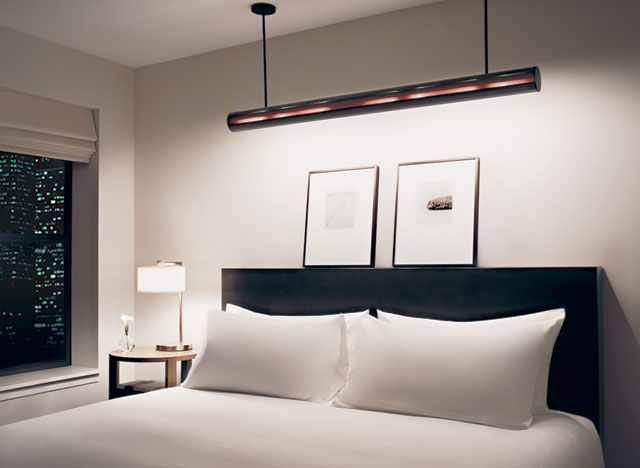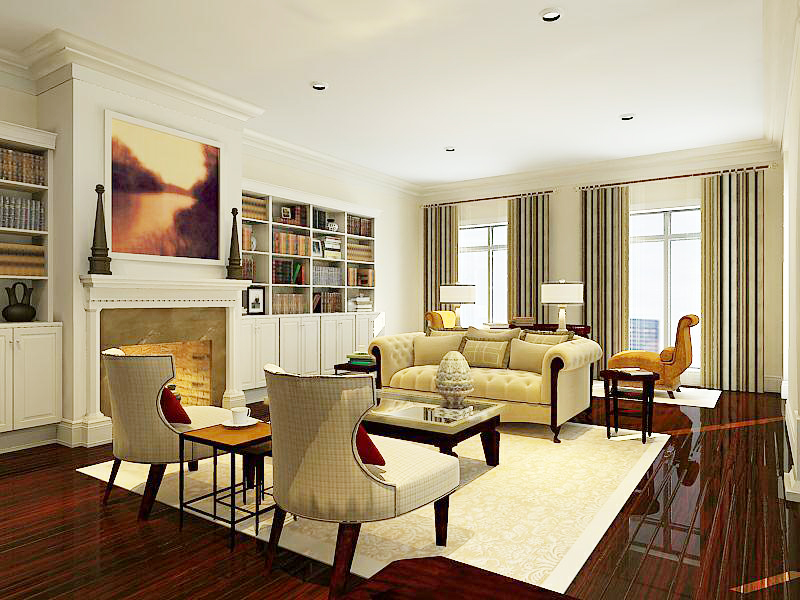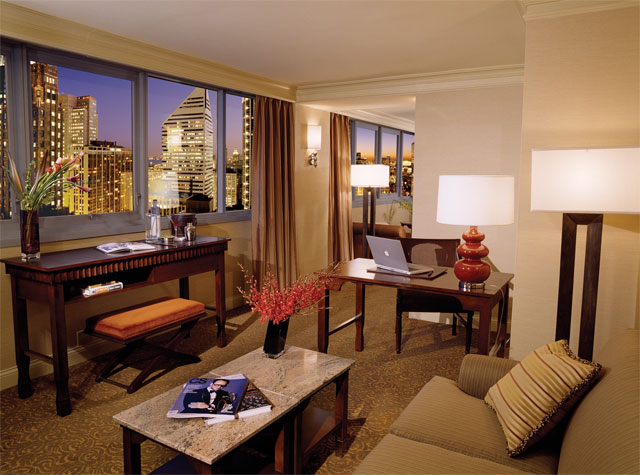
Buyers have high hopes, little experience with new housing hybrid
Businessman Steve Snyder bought two hotel condos at the Solis Chicago Condominiums downtown because the concept, a relatively new one for Chicago, made perfect sense to him personally and professionally.
Snyder loves the thought of owning a vacation unit close to top restaurants, the theater district and the shops of the Mag Mile. He also likes the fact that when he is not in residence, he can use a unit to entertain employees and clients of his real estate brokerage, or rent it out and generate income.
“I just have confidence it will be a great investment,” says Snyder, who’s from Bloomington, Illinois. “I think there will be a lot of different uses, and as we move forward we will kind of figure everything out.”
Testing the waters
A growing number of buyers and developers seem to share Snyder’s optimism. At least 10 hotel condo developments containing around 2,274 units were being marketed in downtown Chicago in early 2006, some scheduled to open within months, others over the next three years.
Not long ago, few Chicagoans knew what a hotel condo was, but pioneers like The Trump Organization set out to educate them. These days, hotel units are selling “almost one-for-one” with residential condos at the Trump project, says sales director Tere Proctor. The overall development was 75 percent sold at press time, according to Proctor.
The optimism over this new form of housing, however, is tempered by an awareness that challenges lie ahead in educating buyers and testing the depth of the market. In April 2006, hotel condos were so new in Chicago that, as The Fordham Company’s Brian Carley put it, “I couldn’t go use one tomorrow,” because none have yet rolled out the red carpet.
Take your pick
Though the market for these units is young in Chicago, it already has a diverse range of projects from which to choose. Developments range in size from the 150-unit Mandarin Oriental, at 215 N. Michigan Ave., to the 454-unit Solis, 71 E. Wacker Drive. Some of the new developments, such as The Raffaello, 201 E. Delaware St., are solely made up of hotel condo suites, and others, like Trump International Hotel and Tower, 401 N. Wabash Ave., offer a mix of hotel and residential condos.
There are familiar names in the mix, including Trump and the Mandarin Oriental, well-established hotel brands, but others, like The James Hotel, at 55 E. Ontario St., are laying the foundations in Chicago for nationwide hotel chains, often with industry veterans at the helm.
Buyers will find hotel condos in elegant, renovated historic buildings such as the Ambassador East Hotel, 1301 N. State Parkway, and in cutting-edge high-rises like the planned Fordham Spire, 420 E. North Water St., designed by Spanish architect Santiago Calatrava.
Prices tend to be high on a per-square-foot basis, but here too, there’s variety. Buyers can find a studio in the $220s at The Raffaello or spend up to $9 million for a top penthouse-style suite at the Solis.
Hybrid housing
Those prices are for deeded units that can be sold at any time, just like traditional condos, though owners have access to all the perks of a high-end hotel, usually on a fee-for-service basis. Amenities and services vary but typically include room service, a 24-hour concierge, valet parking, a spa and a fitness center.
When owners aren’t in residence, they can place their units in the hotel’s rental pool and generate income. At some hotel condos, such as The Elysian Hotel and Private Residences, 11 E. Walton Place, limits are placed on the number of nights owners can use their condos. At others, including Waterview Tower and Trump, buyers can stay in their condos for an unlimited number of nights every year.
Hotel condo owners pay property taxes and monthly assessments and generally share in the cost of operating the hotel.
The concept is better known in places like Florida and New York, but it expanded after 9/11, when developers found obtaining loans for hotel projects more difficult. They began selling hotel condo units as a means of building equity for their developments, says Bob Waun, co-founder of Vacation Finance, a leading national mortgage lender for hotel condos.
Investors, empty nesters
Empty nesters, out-of-towners, investors and businesses have been buying the units in Chicago, encouraged by the growth of the city, especially downtown.
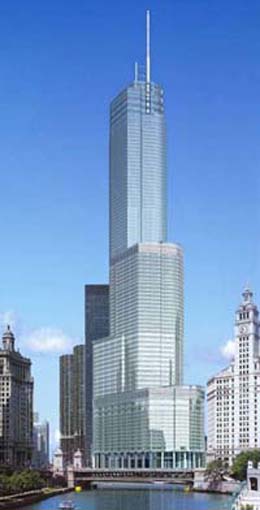 David Pisor, managing partner of Elysian Development Group, which is marketing The Elysian Hotel, said at press time that 62 percent of The Elysian’s hotel condos were sold after two years on the market. He estimates that 60 percent of his buyers are empty nesters from the suburbs, 20 percent are from out of state, and 20 percent are businesses looking for corporate suites or companies that operate vacation clubs.
David Pisor, managing partner of Elysian Development Group, which is marketing The Elysian Hotel, said at press time that 62 percent of The Elysian’s hotel condos were sold after two years on the market. He estimates that 60 percent of his buyers are empty nesters from the suburbs, 20 percent are from out of state, and 20 percent are businesses looking for corporate suites or companies that operate vacation clubs.
“It’s a lifestyle or investment decision,” says Chris Kenny, vice president of Palladian Development, which is marketing the Mandarin Oriental Hotel. “In some cases, it’s both. It’s a hybrid.”
, which is marketing the Mandarin Oriental Hotel. “In some cases, it’s both. It’s a hybrid.”, which is marketing the Mandarin Oriental Hotel. “In some cases, it’s both. It’s a hybrid.”Chicago real estate agent Mona Jee says her hotel condo unit at Waterview Tower will be a good investment, but like many buyers, she’s also lured by the high-quality amenities offered by the Shangri-La Hotel chain, which will operate the hotel portion of Waterview Tower. Jee says she’s looking forward to pampering herself at CHI, the Spa at Shangri-La, which offers ancient Chinese and Himalayan healing therapies.
“They’ll get people coming to the hotel just for that,” Jee says. “And I need it too, it’ll be a treat.”
Hotel condo developments are enticing buyers with amenities ranging from luxury spas to sleek bars.
At The James Hotel, 55 E. Ontario St., the amenities include a restaurant, David Burke’s Primehouse, and a hip cocktail lounge called J Bar. The James also features plasma TVs and stereos with iPod/MP3 docks in its suites.
The Elysian Hotel offers buyers the use of a swimming pool, steam room, and yoga and Pilates classes.
For many buyers, location is a draw card. Florida couple Lisa and Bob Morris visit friends in Chicago three or four times a year and decided to buy a hotel condo at The Elysian after falling in love with its Gold Coast location. Lisa Morris says she likes being so close to luxury department store Barneys New York, 25 E. Oak St., and the upscale French-Vietnamese eatery Le Colonial, 937 N. Rush St., which has “the best spring rolls in the world.”
But mostly, it made sense to buy a hotel suite rather than to continue throwing away money on renting them, Lisa Morris says. With a hotel condo, she can own a vacation unit without any maintenance worries.
“I can rationalize it better than a condo,” she says. “I would have to deal with the hassles of renting a condo and this way, they take care of everything for you and you get some rental income. My guess is I’ll break even relatively soon.”
Investment potential
Like most buyers in this niche, the Morrises have done their own research into the hotel condo market. Developers won’t provide pro formas or even talk about a unit’s investment potential because that technically would make their projects securities, subject to the regulations of the Securities and Exchange Commission.
Most buyers of property consider investment potential, but Bob Waun, from mortgage lender Vacation Finance, says that people buying hotel condos purely for the income and investment might be disappointed to find that they can’t turn a monthly profit.
Waun, who owns two hotel condos, says that the dynamic nature of the hotel industry makes predicting monthly costs difficult. A hotel can perform worse than anticipated; heating and other costs can be higher than budgeted; and vacancy rates can rise unexpectedly.
But those who value the hotel condo as a vacation home, might find it’s a worthwhile investment when they factor in the lifestyle benefits, the tax benefits and the likely appreciation of the unit when the time comes to sell, Waun says.
He is betting that demand for hotel condos will outstrip supply in years to come as retiring baby boomers scout second homes.
High occupancy, top names
If the goal is to generate income to cover as much of the cost of ownership as possible, buyers should try to find a hotel with a consistently high occupancy rate and a top name, experts say.
Some buyers at The Elysian researched rates at The Four Seasons and The Peninsula hotels, according to Pisor, to get a feel for market conditions.
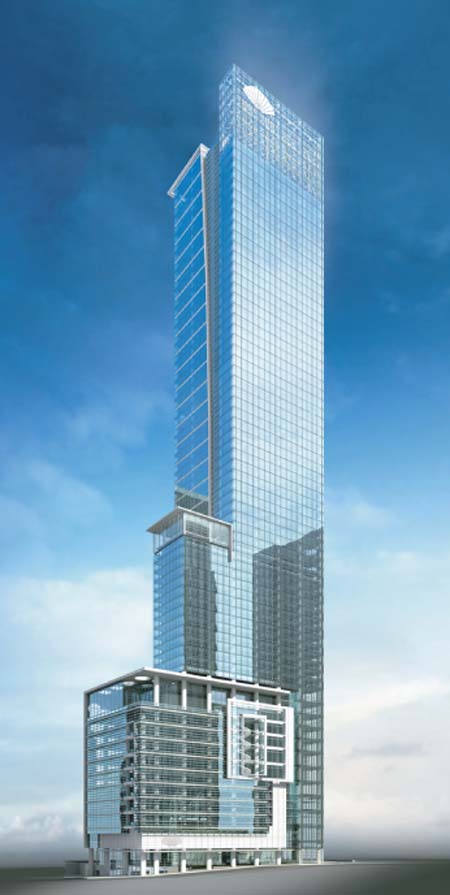 Last year room rates averaged $168.59, according to Theodore Mandigo, of Elmhurst-based hotel consultancy T.R Mandigo. But the prices of rooms at the best hotels can be far higher. Occupancy rates also vary depending on the hotel, but the average daily hotel occupancy rate in 2005 was 72.4 percent downtown, up from 70.6 percent in 2004.
Last year room rates averaged $168.59, according to Theodore Mandigo, of Elmhurst-based hotel consultancy T.R Mandigo. But the prices of rooms at the best hotels can be far higher. Occupancy rates also vary depending on the hotel, but the average daily hotel occupancy rate in 2005 was 72.4 percent downtown, up from 70.6 percent in 2004.
“The market is pretty healthy, and I’m projecting a 2 percent occupancy increase and 7 percent increase in rates in this coming year,” Mandigo says.
Mandigo would prefer to see New York-style occupancy rates of more than 80 percent before diving into the hotel condo market. But Robert Falor, president of The Falor Companies, which is developing the Solis and has just closed sales at Hotel Blake, 500 S. Dearborn St., says that an occupancy rate of 70 percent or more indicates a “strong market.”
Waun, of Vacation Finance, tells prospective buyers to look for a development that possesses what he calls “rare air.” That is, opt for projects that involve experienced hotel operators, offer top-drawer amenities and are in outstanding locations.
“We look for all three,” he says.
Mona Jee, who bought a hotel condo at Waterview Tower, where 15 percent of the hotel condo units were sold at press time after four months on the market, is confident of the development’s success based on the reputation of the hotel operator.
“The Shangri-La is the number one hotel in Asia,” Jee says. “Anyone coming from Asia would pick a hotel they were comfortable with, and because it’s five-star, it will also pick up the leisurely weekend travel crowd and business crowd.”
Chicago a draw card
Perhaps one of the biggest attractions in this market, buyers and developers say, is the city of Chicago itself.
“The Chicago market is growing tremendously, rates are going up, occupancy is going up and Chicago is really hot,” says The James Hotel Group partner and chief operating officer Brad Wilson. The James opened as a hotel in March, and at press time, was registering potential buyers, with plans to begin sales in late summer.
Chris Kenny, of The Palladian Development Group, is enthusiastic about the Mandarin Oriental’s prospects for success locally, saying the Windy City has “plenty of draws.”
“Millennium Park was built, the White Sox won the World Series, and McCormick Place is being expanded, allowing them to do two conventions at once,” Kenny says.
Hotel condo glut?
But with so many developers eyeing Chicago, is there danger of a glut?
“I don’t think anybody has a clear understanding of the depth of the marketplace or the resale value,” says Jerry Cataldo, executive vice president of development at Hostmark Hospitality Group. In early 2006, the company began taking reservations for suites at The Amalfi Condo Hotel, 20 W. Kinzie St., and has been “very, very well received,” Cataldo said.
Cataldo and some other developers interviewed, say they are confident in their product, but also have a “Plan B” ready, if necessary.
“We are bullish on the Chicago market long term,” Cataldo says. “There certainly is risk in it,” he notes. “If there is not the depth of the marketplace, or the environment changes and the concept isn’t desirable, we are comfortable with moving forward as a traditional hotel.”
Chris Kenny at the Mandarin Oriental Hotel says a glut is always a possibility.
“But Chicago has a strong economy without the peaks and valleys of a ‘dot-com’ sort of climate,” he adds. “It’s a fairly safe place for an investment.”
The nascent hotel condo market, Kenny says, “is here to stay.”

